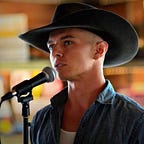On Taylor Brown’s ‘Gods of Howl Mountain’
Brown’s third novel is an intense slow-burner of folk remedies, witchcraft, bootlegging, & working man’s woes.
Taylor Brown
Novel | 304 Pages | Reviewed: Paperback ARC
9781250111777 | First Edition | $26.99
St. Martin’s Press | New York City | BUY HERE
Gods of Howl Mountain features a classic setup: the primitive forces of the earth — represented in folk remedies, witchcraft, and the working man — battle against the capitalist machinery of the mills, the government, and the police. And being familiar with Brown’s work, one would expect quite the epic confrontation when given these pawns to guide. But, almost like a bullfighter, Brown flags his reader, has us chasing the red when the real flesh is just beside us. Gods of Howl Mountain is a much more intimate book than its trappings declare. Despite the roaring engines, the panthers, the gunfights, Howl is a book very nearly about failure, and about fragile masculinity.
Rory Docherty, recently returned to his home from the Korean War, gets back to bootlegging for the nebulous Eustace Uptree, a monolithically frightful but keenly mortal figure. Rory is backed by Eli Uptree, mechanic and chronic beard-puller, and likewise a portrait of masculinity and, simultaneously, emasculation. Rory himself is a man apart — wounded in the war, he has a wooden leg and a hesitant trigger finger. These three men pivot through their sides on the axis of Granny May: witch, whore, master of her terrain. She is Rory’s grandmother, who raised him in lieu of his mother; Eustace’s lover; and Eli’s doctor/occasional figure of lust. These figures then battle with the changing times, the shifting alliances of the law, and a violent episode in the past that killed Rory’s father and muted his mother — itself an incident that reflects the conceit of failure, and women defeating men. Throughout the book, Rory must simply try to make his way, while the world seems bound and determined to stop him. He fights with a rival car fiend and bootlegger, only to have this nemesis pulled from the playing field. He pursues a girl whose father may have been involved in the night that took his parents away. His car, the unbeatable Maybelline, frequently stalls under the perfidy of others. Rory’s victory, or more softly spoken, success, is always snatched away.
And yet, Howl, for all its feinting and bootlegger turns, spends a good deal of its time idle and quiet, especially at the beginning. The villains, part of the book’s titular gods, do not coalesce until its final pages. The action is occasionally piecemeal — here a race, there a drubbing — and some of it doesn’t quite lead anywhere surprising, though the end payoff is worth the slower beginning ride. The plot shifts throughout the story; just as we get some traction with Rory, we swap out to Granny May, digging up herbs — and just when we get going with her shotgun, we cut to flashbacks of Rory’s parents courting. This can occasionally cause a feeling in the book of stasis, that it’s never losing or gaining speed, despite all the driving and fast-paced action on the pages.
The prose had its throttle stuck wide open at times, as well, and while Brown’s truest gift lies in expression, that gift also culminates in dense passages that cannot be read lightly or briskly. The world Brown has created reads at times like we’re experiencing a hangover; everything is bright and loud, and like the drunk who is facedown on the floor, very little in his purview exists without examination. A third of the way through the book, every road is still brilliant and new:
“Highway 321 […] clutching blasted rock faces striated by dynamite grooves, crooking in hairpins sheered against the stars. Guardrails zagged in the headlights like endless bolts of lightning, striking ever deeper into the night.”
A fine pair of sentences, but it can sometimes get lost in the face of every other punch-packed sentence in the book carrying similar weight and intensity.
But Brown really does excel in his lines. Moments reach laugh-out-loud hilarity. Rory and Eli, riding with a tank full of corn, get to ribbing one another:
“Tell you what, I’d eat the crust off a heifer’s teats about this moment.”
“[…] You had a apple not two hours ago.”
“Mushy as mule shit. Tasted about the same, too.”
“You’d bitch if they hung you with a new rope.”
And when the opportunity is right, Brown’s eye strictly works. About to race at a country speedway:
“The sound of the motors tore through the night [. …] Children slapped their hands over their ears, muffling the noise, their daddies watching stone-faced and open-eared as if they took a grim pleasure in going deaf.”
Howl, designed to be an intense burner, does pick up speed in later pages. Rory races his nemesis, bests a serpent, and confronts the man he thinks is responsible for his mother’s sorry existence. This climax is itself lengthy and winding, but it feels breakneck compared to the buildup of the first half of the book, and its positioning of characters is also satisfying. Granny May, for all her spoken ability, doesn’t get to do much moving in the plot until the end — and it’s as good as expected. With that act, vital and vengeful as it is, Granny May closes the loop on the book, ending the failures the men perpetrated and perpetuated, and begins to grow something new.
ERIC SHONKWILER is the author of Above All Men, 8th Street Power & Light, and Moon Up, Past Full. He is the winner of the Coil Book Award, Luminaire Award for Best Prose, and a Midwest Connections Pick by the Midwest Independent Booksellers Association. He was a Chancellor’s Distinguished Fellow at the University of California Riverside and a New River Gorge Winter Writer-in-Residence in West Virginia.
